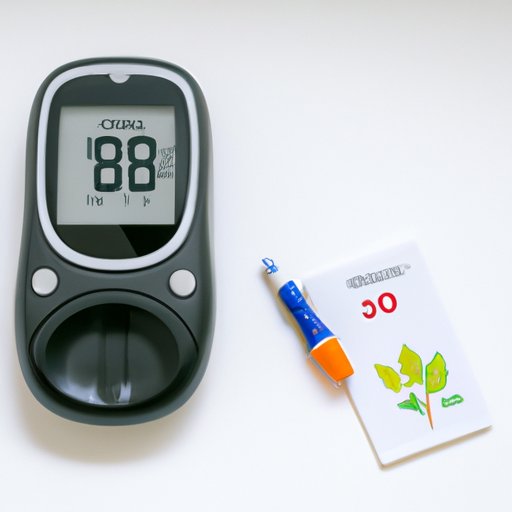Introduction
Blood glucose, also known as blood sugar, is what fuels our bodies. It is an important measure of health, especially for those with diabetes. Understanding what a healthy blood glucose level is and how to maintain it is essential for those with diabetes to have good health and avoid complications. In this article, we will explore what is a healthy blood glucose level, what are the recommended levels for diabetes, factors that affect blood glucose levels, long-term effects of unhealthy levels, foods to eat to maintain healthy levels, and tips to help lower levels quickly.
What Are the Recommended Blood Glucose Levels for Diabetes?
The American Diabetes Association (ADA) recommends that people with diabetes aim to keep their blood glucose levels within the following ranges:
- Before meals: 80 – 130 mg/dL
- After meals: Less than 180 mg/dL
It’s important to note that these are general guidelines and may vary depending on the individual’s age, overall health, and other factors. People with diabetes should work closely with their healthcare providers to determine their individualized target range.
To monitor blood glucose levels, people with diabetes can use a glucometer, which is a device that measures the amount of glucose in a person’s blood. Glucometers come in a variety of brands and types, so it’s important to find one that works best for the individual.
Factors That Affect Blood Glucose Levels
There are many factors that can affect a person’s blood glucose levels, including stress, diet, exercise, and medications. Let’s take a closer look at each one.
Stress
Stress can cause blood glucose levels to rise. This is because when we are stressed, our bodies release hormones such as cortisol and adrenaline, which can increase our blood glucose levels. To help manage stress, it’s important to find ways to relax such as meditation, deep breathing, or yoga.
Diet
The foods we eat can have a significant impact on our blood glucose levels. Eating too much sugary or processed foods can cause blood glucose levels to spike, while eating a balanced diet with plenty of fruits, vegetables, lean protein, and whole grains can help keep levels steady. It’s important to talk to a doctor or nutritionist about creating a meal plan that works for the individual.
Exercise
Regular physical activity can help keep blood glucose levels in check. Exercise can help the body use insulin more efficiently, resulting in lower blood glucose levels. It’s important to talk to a doctor or physical therapist about what type of exercise is best for the individual.
Medications
Certain medications can affect blood glucose levels. For example, some medications used to treat high blood pressure can cause blood glucose levels to rise. It’s important to talk to a doctor about any medications being taken and how they might affect blood glucose levels.
Long-Term Effects of Unhealthy Blood Glucose Levels
Having consistently high or low blood glucose levels can lead to serious health problems. Long-term effects of unhealthy blood glucose levels include heart disease, high blood pressure, kidney damage, and nerve damage.

Foods to Eat to Maintain Healthy Blood Glucose Levels
Eating a balanced diet is essential for maintaining healthy blood glucose levels. Foods that are particularly beneficial for keeping levels in check include complex carbohydrates, lean proteins, fruits and vegetables, and healthy fats. It’s important to talk to a doctor or nutritionist about creating a meal plan that works for the individual.

Tips to Help Lower Blood Glucose Levels Quickly
If a person’s blood glucose levels become too high, there are several steps they can take to help lower them quickly. These include exercising, avoiding sugary foods, taking diabetes medication as prescribed, and monitoring blood glucose levels regularly.
Conclusion
In conclusion, having a healthy blood glucose level is essential for people with diabetes. Understanding what a healthy level is and how to maintain it is key for preventing long-term health complications. Eating a balanced diet, exercising regularly, avoiding sugary foods, taking diabetes medication as prescribed, and monitoring blood glucose levels regularly can all help keep levels in check.
(Note: Is this article not meeting your expectations? Do you have knowledge or insights to share? Unlock new opportunities and expand your reach by joining our authors team. Click Registration to join us and share your expertise with our readers.)
